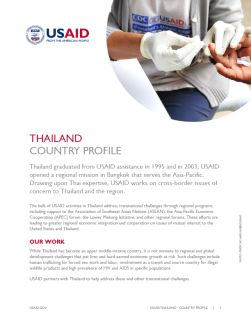A key U.S. ally, Thailand plays a critical role in fostering stability and security in Southeast Asia, a region threatened by rising authoritarianism and anti-democratic influences. Building a more democratic Indo-Pacific region, the United States partners with Thailand to strengthen democratic governance, boost economic growth, improve health, and bolster regional efforts to protect human rights.
USAID’s activities in Thailand aim to overcome transnational development challenges that threaten regional stability and economic growth. By working with regional bodies like the Association of Southeast Asian Nations and the Lower Mekong Initiative, USAID helps to foster regional integration and cooperation.
OUR WORK
Owing to Thailand’s commitment to growth and development, Thailand is a middle-income country. Despite progress, significant development challenges – including human trafficking, violent extremism, wildlife trafficking, and high prevalence of HIV and AIDs – threaten Thailand’s long-term prosperity. USAID partners to solve these and other challenges that impede Thailand’s self-reliance.
HUMAN RIGHTS AND GOVERNANCE
USAID promotes good governance to protect and empower vulnerable populations. Those who are targeted for human trafficking, as well as lesbian, gay, bisexual, transgender and intersex individuals are especially vulnerable to violence, social stigma and discrimination. Between 2017 and 2018, USAID reached nearly one million young men vulnerable to human trafficking across 10 provinces with information to protect themselves and where to find help if needed.
HEALTH
USAID’s regional health programs help to combat HIV and AIDs, malaria and emerging infectious diseases. To help control the HIV epidemic, USAID implements methods that reach, test, treat and retain key population individuals. Since 2017, USAID’s HIV/AIDS programs have benefitted more than 65,000 Thais, building a healthy population.
Aligning with Thailand’s national strategy to eliminate malaria by 2024, USAID focuses on strengthening surveillance systems. Thanks in part to U.S. assistance over the past 20 years, malaria deaths have declined by more than 90 percent, and the country is now better able to track progress, monitor drug resistance and ensure successful treatment for each malaria patient.

